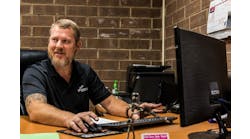It wasn’t long before all of the congratulations started pouring in.
Allen Sutfin was born and raised in Yuba City, Calif., and his shop, Golden Valley Auto Body, had become a pillar of the local business community. So, when a shop with a similar name opened just a couple of miles down the road, Sutfin’s customers thought it was great to see his business expanding.
“I got quite a few people coming in and saying, ‘Hey, the new shop looks great. Congrats,’” Sutfin says. “Then I’d have to explain to them it wasn’t my shop.”
A large multiple-shop operation (MSO) had moved into town just a little more than two miles down one of the area’s largest roads. It had a similar look—a simple, tan cement and brick exterior and an understated sign—and a similar name.
(Editor’s note: The name of the MSO has intentionally been withheld from this story.)
“To someone just driving by, it was pretty easy to just take a quick glance and assume that it was our new location,” Sutfin says. “I wasn’t too concerned about it, until I heard of some of our customers using them by accident.”
—Allen Sutfin, owner,Golden Valley Auto Body
Sutfin had seen his business grow rapidly leading up to the time this new shop opened in 2009, but suddenly, he had ample reason to worry that growth might end.
“Competition is competition, and I’ve dealt with that my whole career,” he says. “This was a little different, though, because people literally were thinking they were us.
“How do you convince them otherwise? That’s what we had to figure out.”
The Backstory
Yuba City is a big market in northern California—plenty of family homes, businesses, and a population of nearly 65,000.
Sutfin grew up in the area and started his career at local shops. He found a perfect opportunity to break out on his own in his hometown when a local shop came up for sale in 1990.
He bought it and instantly started making changes.
Sutfin focused on the things he knew best—customer communication, quality work and creating a solid standing in the community—and he steadily grew his business.
In 1990 (Sutfin’s first year in charge), the shop did roughly $300,000 in sales. By 2008, the shop had expanded to a larger building in a better location. By 2009, the repair center was quickly approaching the $1 million mark in revenue.
The Problem
When Sutfin first heard that an MSO was coming into town, he knew there’d be some confusion, based on the similar names.
He didn’t anticipate his shop’s stellar reputation actually coming back to bite them, though.
“I was born and raised here, and we’re heavily involved in the community,” Sutfin says. “People knew us and our name, so when they saw that [new] shop, they instantly thought of us. We had such a good name and had been known for our quality work and our service, people were eager to support us.
“There’s no doubt about it: We lost a pretty good handful of jobs to them right away, just because people thought they were us when they booked their appointments. I mean, we had people telling us that.”
A few jobs lost here or there was troubling to Sutfin, but the bigger worry was long-term, he says. How would it affect his shop’s reputation? Would it change his shop’s perception, blurring their work together with generic competitors?
His success was essentially built on that stellar reputation. He needed to protect it.
“I knew we had to do something quickly,” he says. “If we didn’t do anything, it would only get worse.”
The Options
One thing Sutfin says he knew for sure: He couldn’t simply treat this MSO like another competing business.
That meant he needed a new approach.
He could alter the shop’s name or its appearance, change its overall branding and try to reinvent it; he could try to “out-do” them, matching prices and specials to get more customers in the door; or he could simply lean on everything that helped his shop reach the point it had—the business’s core competencies.
The Decision
Sutfin started by taking a hard look at his business.
“The biggest thing was pinpointing what our shop does and had that they didn’t have,” he says. “Well, our biggest advantage is that we’re locally owned and operated. We had been a part of this community for years—and we needed to remind people of that.”
It started with his marketing approach.
Sutfin always prided himself on having a knack for marketing, and while his past projects had been, for the most part, very successful, he felt they needed a tweak to better suit the situation.
He began emphasizing the “locally owned and operated” angle in all materials. He also started hammering home the “Done right, done on time” slogan in everything that customers saw.
“These are things that make us standout,” he says. “And it was important to make sure people were reminded of that.”
He also stressed the distinction in his shop’s name through different fonts and wording, and placed a new emphasis on detailing the shop’s location in all advertisements.
“We’re located in between the two main bridges that connect Yuba City to Marysville across the river,” he says. “So, we made sure it said that in every ad.”
Sutfin does a lot of radio advertising, some billboards, direct mail and even television, depending on the time of year. He utilized the new approach on all of it.
He also made sure to continue, if not increase his involvement in the community. He is active in the area’s chamber of commerce and his shop hosts a number of charity events. This past Thanksgiving, Golden Valley Auto Body hosted a local turkey drive with the United Way. The event was broadcast live on two local radio stations.
“It was a big day,” he says. “Things like that are great for the area, and it’s the kind of thing we like to focus on. It’s the kind of stuff other people aren’t doing as much.”
The Aftermath
Sutfin made these changes quickly throughout 2009.
In each of the three years that followed, the shop showed at least 15 percent year-over-year revenue growth. The shop now pulls in $1.3 million annually in sales, and Sutfin expects that number to rise even more in 2013.
And, most importantly, he doesn’t have anyone congratulating him on his new shop anymore.
“I think that level of confusion is gone now,” he says. “People seem to really understand it now.”
The Takeaway
Too many shops lose focus of what makes them successful, Sutfin says, and he strives to make sure Golden Valley Auto Body never does that.
Don’t get distracted by competitors or your own success, he says.
“I think a lot of people get wound up on what their competitors are doing,” he says. “I think you have to keep a pulse on that, but you won’t thrive on that. You have to work on your own business. Let them work on their business, and you work on yours. It goes back to the whole thing with the core competencies. Take advantage of what you do well.
When you start seeing success, he adds, it’s easy to stop thinking about what got you to that point. “You can’t do that,” he says. “If you focus on who you are as a business, then your customers will know who you are. There won’t be any confusion about it.”


